BEIRUT, 13 March (IRIN) – BEIRUT, 13 March 2006 (IRIN)
B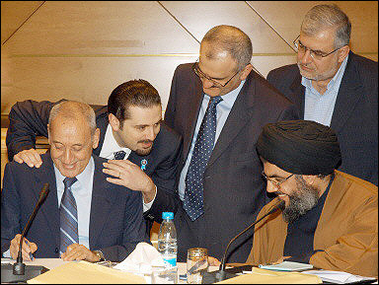 EIRUT, March 14 (Reuters) – Lebanese leaders agreed at national talks on Tuesday to disarm Palestinian factions outside refugee camps within six months and called for full diplomatic ties with Syria. But the officials meeting to end a political crisis that has paralysed the country did not agree on the two hottest issues: disarming the pro-Syrian Hizbollah guerrilla group and the fate of pro-Syrian president Emile Lahoud.
EIRUT, March 14 (Reuters) – Lebanese leaders agreed at national talks on Tuesday to disarm Palestinian factions outside refugee camps within six months and called for full diplomatic ties with Syria. But the officials meeting to end a political crisis that has paralysed the country did not agree on the two hottest issues: disarming the pro-Syrian Hizbollah guerrilla group and the fate of pro-Syrian president Emile Lahoud.
03.13.2006, Leaders of Lebanon’s rival factions resumed talks Monday after a weeklong break in an attempt to agree on the biggest issues that divide the country – the fate of the pro-Syrian president and the U.N. call for Hezbollah’s disarmament.
Troops, armed police and concrete barriers cordoned off the parliament building Monday as the 14 faction leaders – Muslim and Christian, pro- and anti-Syrian – arrived for the talks. Druse leader Walid Jumblatt came in an inconspicuous car – a small, old Renault – for the sake of security. His bodyguards followed in a similar vehicle. "We must use all our potential to prevent the dialogue from collapsing," Parliament Speaker Nabil Berri was quoted as saying. "The conference provides a precious opportunity for national salvation," Berri said in Monday’s edition of As-Safir newspaper. The conference began on March 2 but adjourned five days later amid sharp differences over what to do about President Emile Lahoud and Hezbollah’s weapons. In announcing the adjournment, Berri said the participants needed time to consult.To view more pictures pls click READ MORE
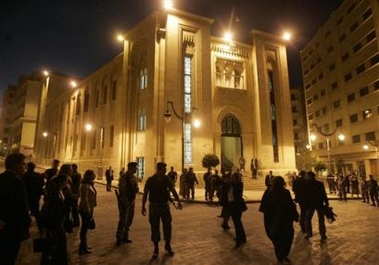 By Lin Noueihed, BEIRUT, March 12 (Reuters) – Lebanese leaders will resume on Monday talks aimed at ending a deep political crisis, but sharp differences remain over the two key issues: disarming Hizbollah and the fate of the Lebanese president. The "national dialogue" conference, the first top-level political gathering since Lebanon’s 1975-1990 civil war, was adjourned abruptly on Tuesday after a row erupted over fiery comments made by an anti-Syrian leader on a visit to Washington.
By Lin Noueihed, BEIRUT, March 12 (Reuters) – Lebanese leaders will resume on Monday talks aimed at ending a deep political crisis, but sharp differences remain over the two key issues: disarming Hizbollah and the fate of the Lebanese president. The "national dialogue" conference, the first top-level political gathering since Lebanon’s 1975-1990 civil war, was adjourned abruptly on Tuesday after a row erupted over fiery comments made by an anti-Syrian leader on a visit to Washington.
Parliament Speaker Nabih Berri, who had called the talks, said they would resume on March 13 instead of continuing until Thursday, but the breathing space does not appear to have brought rival politicians much closer to consensus. "The conference may come up with resolutions on some issues such as Palestinian arms and the status of the Shebaa Farms but there are difficulties reaching agreement over the two key issues," said a Lebanese political source close to the talks.
By CNN’s Hala Gorani, Here in Beirut, apart from a pristine rebuilt center, bullet-riddled buildings and half-destroyed structures are still commonplace."Sometimes, it’s important to keep the scars so you remember how bad it was," renowned Lebanese architect Nabil Gholam told me on a tour of Martyr’s Square.Most readers probably know Martyrs’ Square as the gathering […]
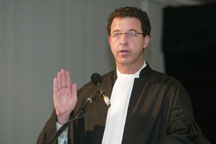 By Evelyn Leopold UNITED NATIONS, March 9 (Reuters) – Lebanon and the United Nations are close to completing plans for a tribunal to prosecute suspects in the 2005 murder of former prime minister Rafik Hariri and others, a Lebanese official said on Thursday.
By Evelyn Leopold UNITED NATIONS, March 9 (Reuters) – Lebanon and the United Nations are close to completing plans for a tribunal to prosecute suspects in the 2005 murder of former prime minister Rafik Hariri and others, a Lebanese official said on Thursday.
The court was set to be located outside Lebanon and headed by a non-Lebanese judge, but would still have "a significant Lebanese presence," Telecommunications Minister Marwan Hamadeh told a news conference. Hamadeh spoke to U.N. officials on a trip to New York and Washington with Druze opposition leader Walid Jumblatt. Hamadeh narrowly escaped an assassination attempt in a car bombing in October 2004 and is the uncle of Gibran Tueni, an anti-Syrian journalist murdered by a bomb in December.
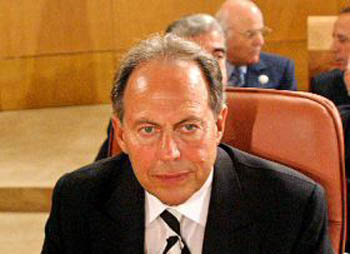 By Omar Halabi BEIRUT, March 9 (KUNA) — Lebanese President Emile Lahoud considers planned resumption of the National Dialogue Conference on Monday as of paramount necessity and cautions that its deadlock may negatively affect general conditions in the country, sources close to the president said on Thursday.
By Omar Halabi BEIRUT, March 9 (KUNA) — Lebanese President Emile Lahoud considers planned resumption of the National Dialogue Conference on Monday as of paramount necessity and cautions that its deadlock may negatively affect general conditions in the country, sources close to the president said on Thursday.
The sources told KUNA that the president "believes that its is quite normal for the conference to last a long time for further consultations for reaching a speedy settlement may not constitute a viable understanding." Top leaders of the country’s diverse political trends plan to resume talks at the Parliament Building in downtown Beirut on Monday, following a series of sessions to discuss prospect of reaching consensus on some of the top controversial issues, such as the arms of the Lebanese resistance and the Palestinian fighters as well as status of the frontier Shebaa farms.
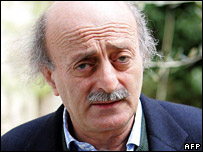 WASHINGTON: Sources here heartily welcomed the visit of March 14 Forces leader, Chouf MP Walid Jumblatt. Unlike Washington’s usual line in friends among the different Arab groups, whose influence often relies on American funds and political support, Jumblatt is a leader in his own right and belongs to a coalition that enjoys popular support in his country and an elected majority bloc in Parliament.
WASHINGTON: Sources here heartily welcomed the visit of March 14 Forces leader, Chouf MP Walid Jumblatt. Unlike Washington’s usual line in friends among the different Arab groups, whose influence often relies on American funds and political support, Jumblatt is a leader in his own right and belongs to a coalition that enjoys popular support in his country and an elected majority bloc in Parliament.
Unlike Iraq’s Ahmad Chalabi and Lebanon’s Michel Aoun, Jumblatt is not seeking American support for personal gain.
Jumblatt has always observed the rules of the game in Lebanon and realizes that his ambitions, as a Druze, are limited to commanding a considerable parliamentary bloc in his homecountry.
Jumblatt already commands such a big bloc and belongs to a bigger solid parliamentary coalition. Accordingly, a healthy parliamentary democracy remains Jumblatt’s best bet.
As a result Jumblatt is believed to have carried genuine Lebanese national concerns to Washington without either any personal ambitions or hidden agenda.
BEIRUT (AFP) – One of the Palestinian militant groups which retains bases in Lebanon said that it would only discuss laying down its weapons once the country’s 380,000 Palestinian refugees have been accorded basic civic rights. The Popular Front for the Liberation of Palestine – General Command (PFLP-GC) — a hardline pro-Syrian group — demanded that a week-long national dialogue conference under way in Beirut tackle the plight of the refugees and not simply the question of militant weapons.
"The Palestinian question in Lebanon should not be discussed exclusively from the security point of view. We’re asking the dialogue conference … to decide on concrete steps as far as the humanitarian, civic and political rights of the Palestinians," PFLP-GC spokesman Anwar Rajab told reporters."If that’s done, the weapons question will not be a problem."Resolution 1559, adopted by the UN Security Council in 2004, requires the disarmament of all militias in Lebanon, including the Shiite militant group Hezbollah as well as Palestinian groups.
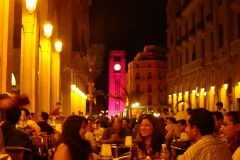 BEIRUT, 6 March (IRIN) – At a glance, Nadine (not her real name) is an innocent, 16 year-old-girl, but a conversation with her soon reveals the shocking details of the hard life she endured as a child. "I didn’t choose to work as a prostitute," she said. "It’s just my luck in life." Explaining how she was raped at the age of nine by a neighbour, and therefore "had nothing to lose" when she accepted money for the first time in exchange for sex with an older man, Nadine blamed her situation on her family’s financial needs.
BEIRUT, 6 March (IRIN) – At a glance, Nadine (not her real name) is an innocent, 16 year-old-girl, but a conversation with her soon reveals the shocking details of the hard life she endured as a child. "I didn’t choose to work as a prostitute," she said. "It’s just my luck in life." Explaining how she was raped at the age of nine by a neighbour, and therefore "had nothing to lose" when she accepted money for the first time in exchange for sex with an older man, Nadine blamed her situation on her family’s financial needs.
"My parents needed money so they sent me to work as a housemaid at the age of 12. Do you know how much I had to put up with in my situation?" Nadine asked rhetorically. "All men want is one thing
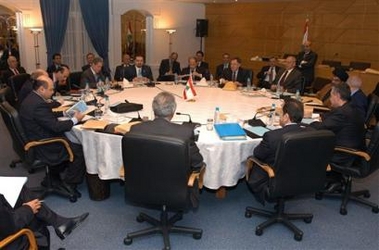 y HUSSEIN DAKROUB ,
y HUSSEIN DAKROUB , 


